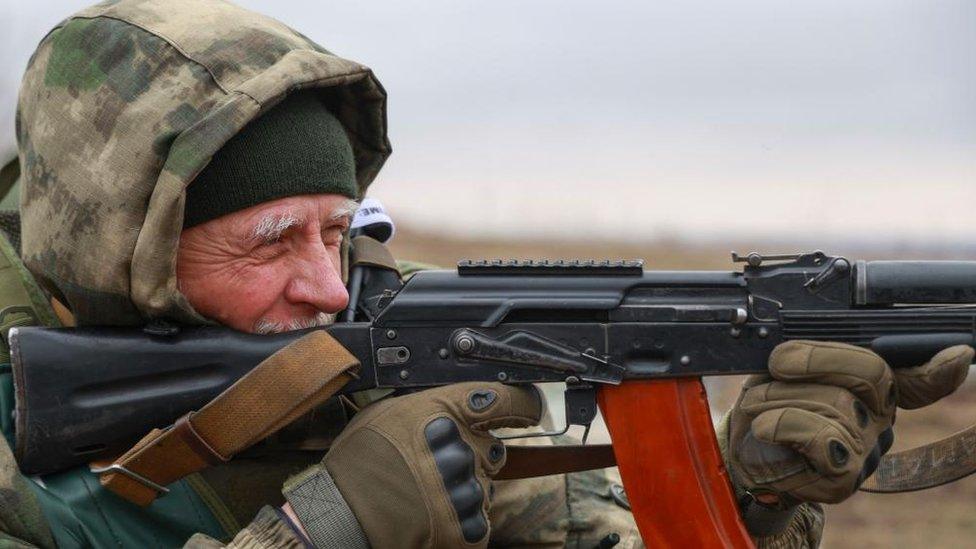Russia election: Stage-managed vote will give Putin another term
- Published
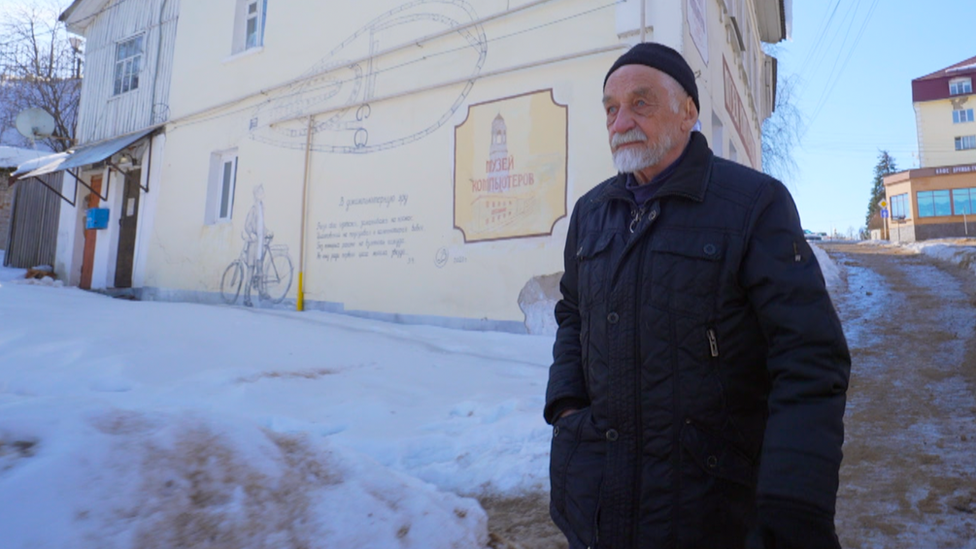
Vladimir Ovchinnikov's street art adorns the walls of Borovsk - except when it becomes too political
As I walk around Borovsk, two things strike me about this town 60 miles (100km) from Moscow.
First, there is almost no sign of the presidential election coming up this weekend.
I see few election banners or billboards and no political flyers being handed out.
Not surprising, really. The absence of election preparations mirrors the absence of drama surrounding a stage-managed event that will hand Vladimir Putin a fifth term in the Kremlin.
The other thing you can't help noticing in Borovsk is the street art. It's everywhere.
Much of it has been created by street artist Vladimir Ovchinnikov. All over town his work stares down from walls and buildings.
Most of his paintings are uncontroversial. Like the giant globe recounting the town's history. Or the image of a famous footballer.
Increasingly, though, when Vladimir paints a picture of today's Russia, it turns out very dark.
"I call this one Pinnacle of Ambition," the 86-year-old artist tells me. The painting he's showing me at home features a man in a martial arts uniform walking a tightrope over a mountain of human skulls.
"This is what the ambition of someone high up in power can lead to."
More dramatic still is his image of two meat grinders mincing people - one is labelled 1937 (the year of Stalin's Great Terror); the other Special Military Operation (Russia's war in Ukraine).
"We haven't learnt any lessons," concludes Vladimir.
My paintings get people thinking: are we right or are we wrong in this conflict?
After the artist graffitied similar meat grinders on a wall, he was fined for "discrediting" the Russian army. Same outcome for his street art showing missiles falling on a girl dressed in the blue and yellow of Ukraine.
Vladimir not only uses his art to comment on the present, but to shine a light on Russia's dark past - the repressions of the Stalin era. His graffiti criticising the war in Ukraine doesn't go down well with the authorities. It gets painted over fast.
"My paintings get people thinking: are we right or are we wrong in this conflict?" Vladimir tells me. "I believe this is a crime against the territorial integrity of a neighbouring state. I'd be condoning it if I stayed silent."
"Many people do keep quiet, because they're scared of repression, of losing their jobs, and of being criticised by others."
After the death in prison of opposition leader Alexei Navalny, Vladimir painted Mr Navalny's portrait on a local memorial stone that honours the victims of political repression.
"The very same day someone scrubbed it out," Vladimir tells me. "But at home I'd painted a rough draft on cardboard. So later I took this and placed it by the memorial."
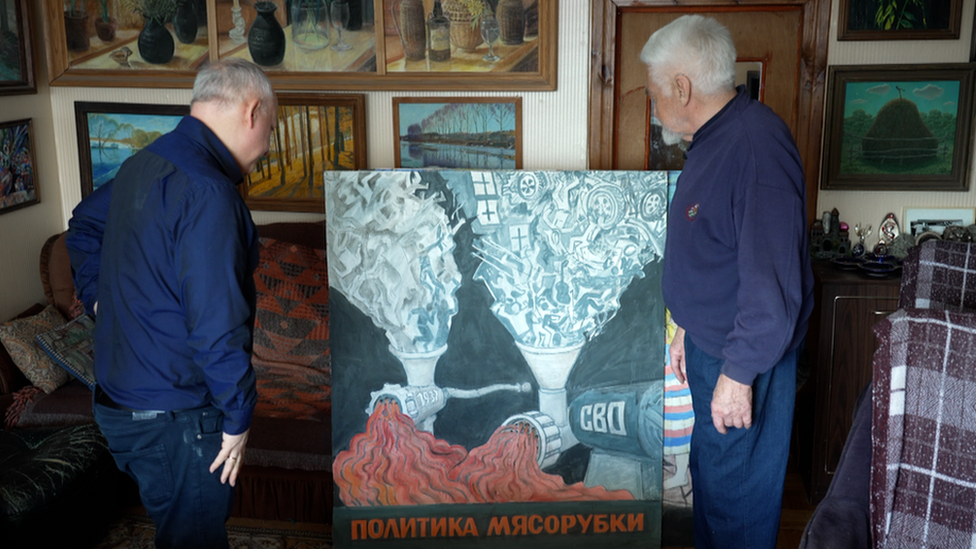
Vladimir says his paintings get people thinking about the conflict in Ukraine
How does Vladimir see Russia's future?
"Some predict more repression," he says, "and that we're heading towards totalitarianism and full dictatorship."
The president's picture
Vladimir Ovchinnikov tells me he never watches television.
If he did, he'd see a very different picture of Russia on state TV.
Vladimir Putin's version.
No mountains of human skulls. No meat grinders. No mention of Alexei Navalny.
This is not a Russia aggressive abroad and repressive at home. It is a Russia with a glorious past and an equally glorious future. A Russia of heroes and patriots rallying round the flag to defend the Motherland from external aggression.
And it is a Russia that loves its current leader.
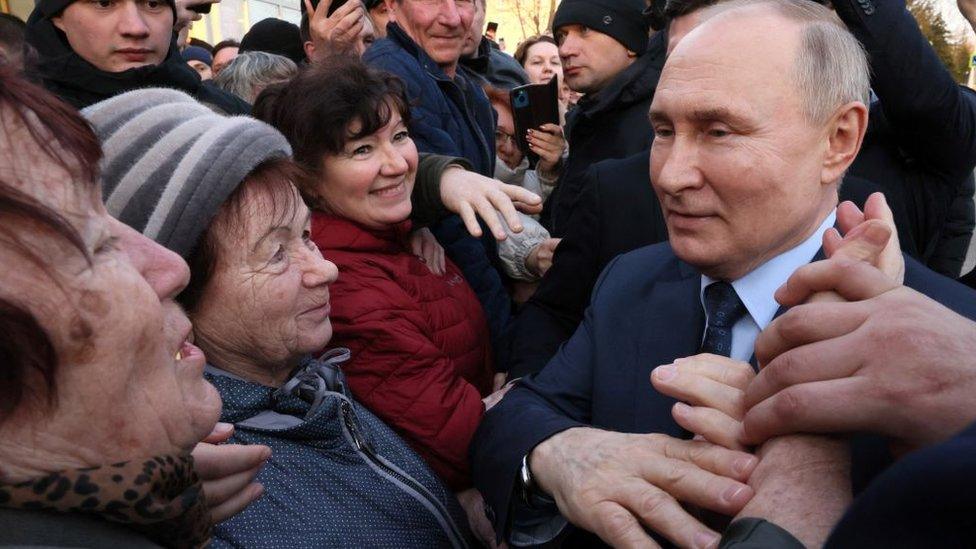
Vladimir Putin is set to win a fifth term in office at this election
A few days ago Russia Channel 1's evening news bulletin showed what appeared to be adoring Putin fans greeting the president like a pop star.
"Take care of yourself," cried one woman, before kissing him.
"Long life!" shouted a man.
If you relied solely on Channel 1 for news, you'd probably conclude that Vladimir Putin is odds on for a landslide victory in the presidential election.
But, just like with paintings, context is important.
And the context here is crucial.
The Kremlin not only controls television in Russia, it manages the entire political system, elections included.
President Putin faces no serious challenge as he seeks a fifth term in office. His most vocal critics have either fled into exile or been jailed at home. Mr Navalny, his fiercest opponent, is dead.
But the Kremlin likes to boast that Russia has the "best democracy" in the world. So, along with Mr Putin on the ballot are three officially authorised challengers from Russia's Kremlin-friendly parliament.
I caught up with one of them recently. It was an odd experience.
"Why do you think you'd be a better president than Putin?" I asked Nikolai Kharitonov, the Communist Party candidate.
"It's not for me to say," Mr Kharitonov replied. "That wouldn't be right."
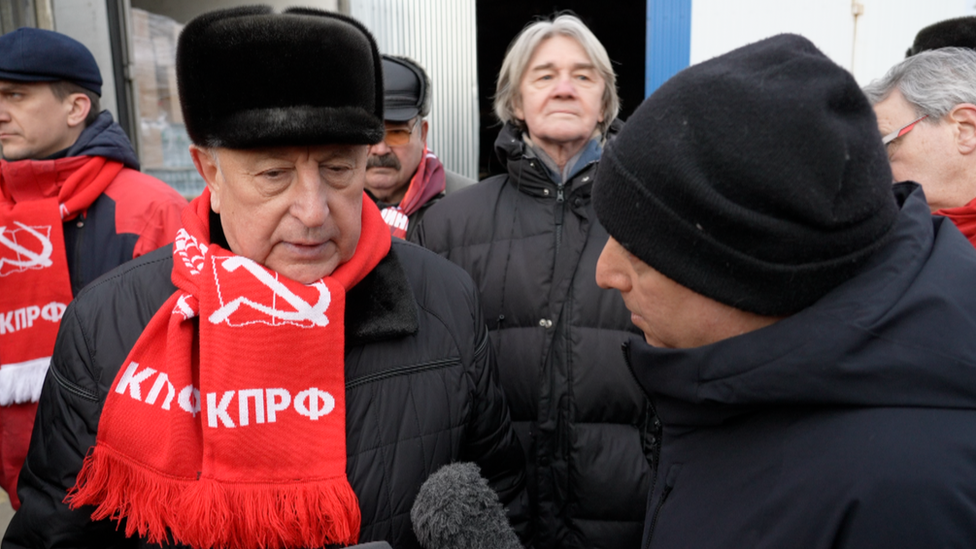
Nikolai Kharitonov (left), the presidential candidate, believes it's not for him to say whether he would make a better president than Putin
"But do you think your manifesto is better than Putin's?" I continued.
"That's for voters to decide."
"But what do you think?"
"It doesn't matter what I think. It's up to the voters."
Instead of talking up himself, Mr Kharitonov praised the incumbent.
"Today Vladimir Putin is trying to solve a lot of the problems of the 1990s, when Yeltsin dragged Russia into wild capitalism," said Mr Kharitonov. "He's trying to consolidate the nation for victory in all areas. And this will happen!"
Something tells me Nikolai Kharitonov's heart isn't in this race.
One politician who'd tried and failed to get on the ballot was anti-war politician Boris Nadezhdin.
It is absolutely impossible to say our presidential elections are fair and free
"It is absolutely impossible to say about our presidential elections that they are fair and free," Mr Nadezhdin tells me. He claims he was barred from running because his anti-war message had been growing too popular.
"The polls show that about 30-35 percent of people in Russia wanted to vote for a candidate, like me, who talks about peace. It is an absolutely impossible result for our government."
The picture on the street
Back in Borovsk I'm enjoying the views from the bridge over the Protva river.
From here the town itself looks like a painting: a picture of Russia I could imagine hanging in the Hermitage. Up on a hill stands a beautiful church, with quaint snow-covered houses below. Bundled up in warm coats, people are treading carefully down icy paths.
I, too, step carefully as I head into town to gauge the mood. On the streets of Borovsk, what do people think about the war, the election, and their president?
"No matter how you vote, everything's decided in advance," a young woman called Svetlana tells me. "I don't see any point in taking part."
But many here, especially older Russians, tell me they will be voting. As I talk to people it becomes clear that the Russia as seen on TV has many supporters.
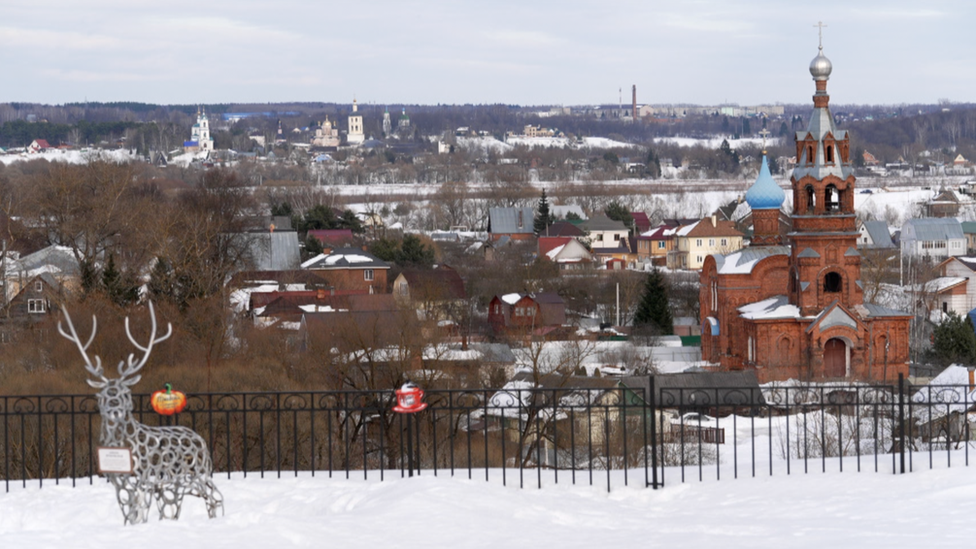
Russia wants its citizens and the world to believe everything is picture-perfect
"I hope Vladimir Putin will win the election and that it will end the war," Lyudmila tells me. "So many young men have been killed. When there's peace many countries will finally understand that Russia is unbeatable."
"Why do you want Mr Putin to win?" I ask. "After all, he's the man who started the Special Military Operation."
"There are many opinions," Lyudmila concedes. "Some say this war should never have been started. Some say he was right. I won't judge him now. We don't know all the political ins and outs."
"Mr Putin's been in power nearly a quarter of a century," I point out. "In a country of 145 million people, is there no one else who could do his job?"
"Oh no, we have many talented leaders who could, in an emergency, run the country," replies Lyudmila.
Nikolai will also be voting for the current president, apparently unfazed by two-and-a-half decades of Putin in power.
"So what? We've had tsars who've ruled a long time," says Nikolai. "There were good tsars and bad ones. We had Stalin and Brezhnev. You can change a leader, but it makes little difference to our lives."
Related topics
- Published17 February 2024
